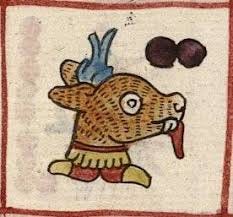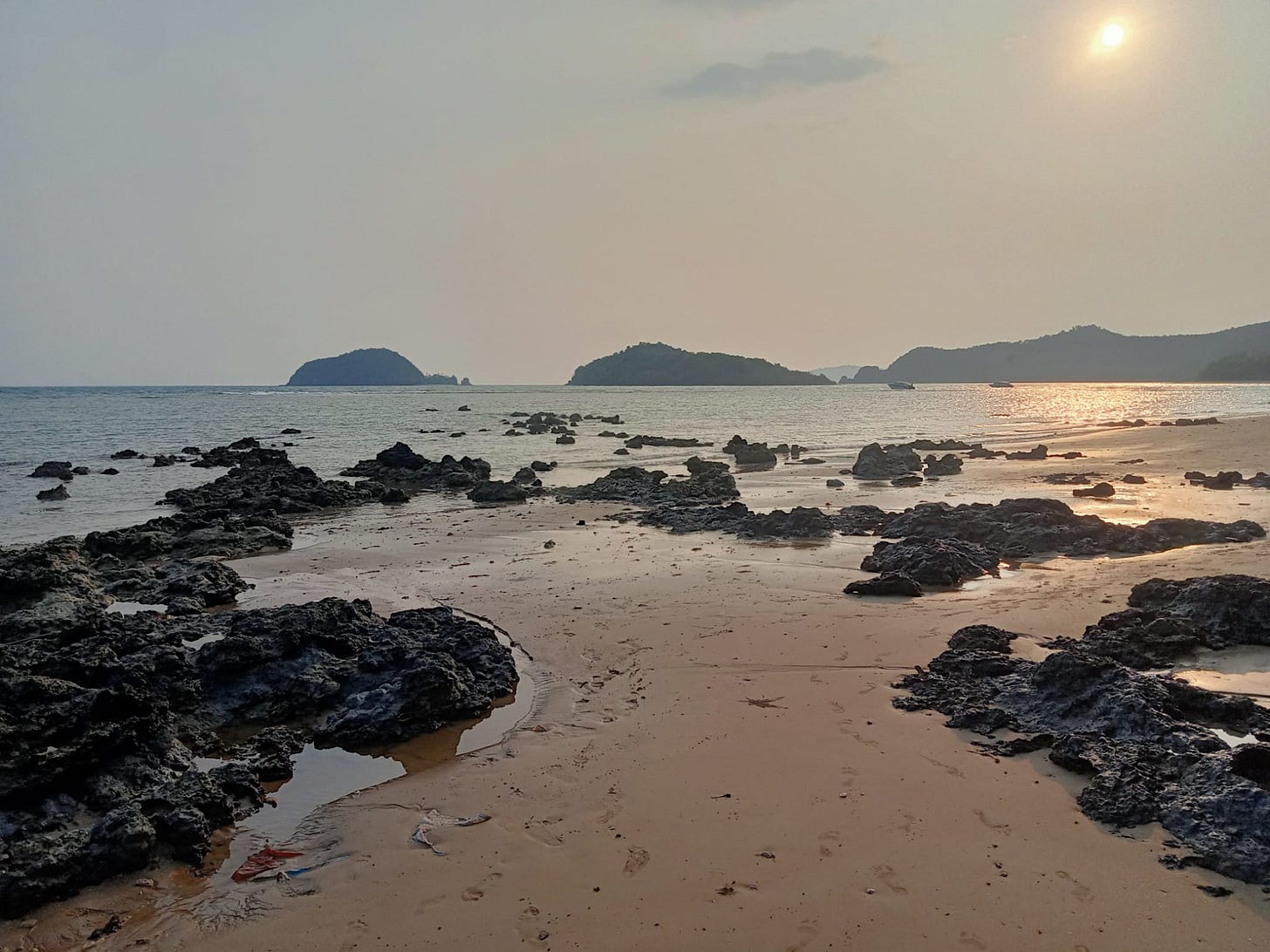Front page of Sunday’s La Jornada.
It’s been quite a few days. I’m still putting it together. The tariffs (known here as aranceles), #HandsOff (known here as yes), the official publication of my new book of poems (Volverse/Volver) and the start of the baseball season (at last), have given me a whole lot to think about.
And, very early tomorrow morning (4:30 AM airport arrival)), I leave for New Orleans for a week! I’m participating in the New Orleans Poetry Festival https://www.nolapoetry.com/home where I’ll be going to lots of readings, including one of my own, chairing a session on Kenneth Koch at 100 years, catching up with old friends, and maybe even having a beignet (or twelve…).
The tariffs have been of concern down here. Not because Mexico got it bad with this round—we didn’t—but because they make no sense world-wide. I think nuestra Presidenta Claudia has continued to handle this situation incredibly well—and I’m going to reflect on that some more in coming posts— but the uncertainty for the world is pushing anxiety to unwelcome levels. Not because costs are going to go up—or down—but because no one believes Trump knows what he’s doing!
The utter stupidity of the formula that Trump derived for the tariffs may help explain why he bankrupted six businesses (including an Atlantic City casino) and why it’s so frightening to see him bring the same ignorance to the US and world economy. Penguin memes aside, they do make some sense politically, if the idea is to use tariffs for political ends and not, as Trump has announced, for some kind of golden age of US prosperity.
What Trump seems not to understand is that if the US economy makes up 25% of the world’s, the other 75% may just sidestep the US—see the trade deal Japan, South Korea, and China are working on together, or Mexico and Canada, or Mexico and the EU. The inroads China is making both economically and politically in Latin America and Africa would normally worry a US president into some kind of action but Trump seems either too oblivious, too ignorant, or both, to care.
(As an important note, in terms of how Claudia is handling the situation: for those of you who might have read David Frum’s piece in The Atlantic on her, and how her handling of the tariffs has given her cover for not handling domestic issues as well as Frum might like, you’ll find a good example of someone who doesn’t seem to have a handle on the situation here at all, but that’s par for the course with US journalists and Mexico).
I was inspired by the #HandsOff protests across the country and around the world. Coverage here seemed to indicate it was widespread and enthusiastic. Yes. Coverage here also suggests that the GOP is fracturing a little—the unhappiness on the part of the citizenry is growing. So why am I reading that here in southern Mexico and not in The New York Times?
I’ve been gratified by initial responses to Volverse/Volver, emails and messages have been enthusiastic. This means a lot to me, so thank you. And as I write this, I have the Mets game playing on radio in the background. Despite the crazy, there are still some ways for the world to make sense. Poetry is one of those ways. Baseball is, of course, another.
To continue celebrating National Poetry Month, it’s with a great deal of pleasure that I present here two poems by Araceli Mancilla Zayas, a wonderful Oaxaca poet and friend, from her book La casa del ciervo. It’s a beautiful book which I am in the process of translating and should be available next year from Aliform Press.
In the collection of 34 interconnected, untitled poems, Mancilla Zayas gives us the figure of the Ciervo, which I do not translate (Deer or Stag would be the best equivalent). In part, I do this to elevate and give greater sense of the profundity and intimacy between the narrator and the Ciervo.
For Araceli, the Ciervo functions as a nahual, a very complex figure in Mesoamerican tradition, particularly in southern Mexico. Traditionally, a nahual can be many things. One is that of the trickster, a shamanic/wisdom figure who can has the ability to take on animal form at will and could act as a guide for other humans between the physical and spirit worlds. During the time of the Spanish conquest and subsequent conversions to Catholicism of the indigenous people of Mesoamerica, the nahual came to be mistakenly interpreted as a darker, less than positive force. Some representations of the nahual have suggested that as a shape-shifter it can be seen as akin to a werewolf. This would seem to be an incorrect though consistent (for the Church’s purposes) representation.
Most immediately, in La casa del Ciervo, the nahual, here the Ciervo, functions as a spirit animal. In this case, the spirit animal functions as a guide into the spirit worlds, as well as a guide through the natural world of this world. In exploring this relationship, the landscapes in the book also shift. We are in Mexico, we are in Europe, in cities and the woods. We are in this world and out of this world. As Araceli explores this relationship with the Ciervo, other (possible) nahuales enter the picture. And as the relationship with the Ciervo deepens, the physical and spiritual become simultaneously erotically sacred and sacredly erotic.
Araceli Mancilla Zayas reading at the Centro Cultural Liliana Loth, San Pedro Ixtlahuaca, Oaxaca, 2024.
6.
La cornamenta del Ciervo me invita a pasar a mi casa de hierba; a profundidades donde se acumula aquello que perdí. Con ese alimento le di de comer a un lobo sin dientes pero muy feroz. Sus pequeños ojos tristes sabían hablar de una ciudad sin océano con muchas azoteas e historias que contar. En esa urbe jugaba a ser rey entre niñas de uniforme y calcetines amarillos. Aquel lobo tenía numerosas heridas causadas por el cielo. Tantas horas pasaba a la intemperie intentando escribir la canción de su viaje desde las cuevas a la gran ciudad, que fue herido por caricias como celos de cristal. La cornamenta del Ciervo lleva mi casa de un sitio a otro. Cada sueño se acomoda en un lugar distinto: si duermo en primavera despierto en ese invierno que congela mi alimento antes de poderlo probar. Por eso el lobo y yo acordamos su estancia en mis habitaciones el día que lo vi por primera vez. Dijo que sería barca, grumete, capitán. También mi cocinero. Le di a cambio el territorio de un limón. No puedes domesticarme, advirtió; pero hablaremos sin aburrirnos para hacer viajar al tiempo. Cuando al fin se fue, se llevó el mapa que habíamos trazado: guaridas secretas, pasadizos. Por eso me hallaste desorientada, acaso perdida, Ciervo.
Image of a nahual mazatl (ciervo or venado or deer in Náhuatl).
6.
Ciervo’s antlers invite me to enter: my house of grass; depths where what I lost grows. With those I fed a toothless and still ferocious wolf. His small sad eyes spoke of an oceanless city, spoke of rooftops, told stories. In that city he played a king among uniformed girls, yellow socks. The sky had wounded that wolf so many times. He spent hour after hour outdoors writing his journey’s song, from caves to city, caresses, crystal jealousy, wounding him. In Ciervo’s antlers, he carries my house from place to place. And each dream dreamt differently: if I sleep in spring I’ll wake in a winter that freezes my food before I can taste it. That's why the day I first saw him. the wolf and I agreed he’d stay with me in my rooms. He said he’d be a boatman, a cabin boy, a captain. He’d be my cook. In return I gave him the territory of a lemon. You can't tame me, he warned; but he wouldn’t bore me: we ‘d travel together through time. When he finally left, he took the map we had drawn: secret lairs, passages. That's why when you found me I wasn’t sure where I was, Ciervo, suddenly lost.
El Danubio/The Danube
8.
Me decías que el humo entraba por la ventila del pasillo del tren. Soñaste el humo. Se quedó haciendo garabatos en el jardín. Se quedó a esperar a Mina, sus maullidos, el arañazo de su pequeña garra. El humo, tan constante. Molesto intruso cada amanecer que entraba a ensuciar la tranquilidad de nuestra respiración. Nos recordaba que el paraíso no es este monasterio en donde hemos inventado una forma de comunicación que al callar será oscura, sucia, como el humo. Decías que había entrado ya al compartimento de dos, en el vagón. Tú arriba, yo abajo. Siento el ciempiés del ferrocarril rozar la hierba. Afuera Budapest es un caserío que vigila los contornos del Danubio. Sigues diciendo del humo. Casi lo palpo, pero es sólo la luz que ilumina las letras de mi libro. En él, una mujer mayor viaja sola en un tren que la lleva de vuelta a su antiguo hogar, sin su pareja. Adherida a viejos hábitos, apenas reconoce el mundo. Hablas del humo mientras el tren marcha hacia Praga y me deposita en mi cama. Toso en la oscuridad. Mina habrá muerto hace años, abandonada; hasta el final, soberbia, la mejor gata callejera por quien ser adoptada. Con majestad dejó la palpitación de su sangre en mi pecho, y una huella lodosa en mis pensamientos. "Ajaaa, Mina, corramos, sube al alamillo, cabrona, corre que te alcanzo ... ". Su mirada es verde, como el pasto y el gusano que se enrosca en el piso de la cabaña. Como la lluvia de este verano. Acre es el humo que aspiro, fuera del tren, del Ciervo dormido, del paraíso.
Budapest.
8.
You told me: smoke had entrered through the train’s ventilation. You dreamed the smoke. It scribbled in the garden. It waited for Mina, her meows, the scratching of her small paw. Every dawn, the constant smoke, an annoying intruder that entered and dirtied the peace of our breathing. It reminded us paradise is not this monastery where we invented our own communication reminded us our silence too will be dirty, dark. You said the smoke had already entered the sleeping car, our compartment. You above, me below. I feel the train, centipede, brush the grass. Outside Budapest, a hamlet watching the curving Danube. You talk about smoke. I almost feel it, but more as the light that illuminates my book. In the story, an elderly woman travels, her train brings her home; without her husband. Wed to the past, she hardly recognizes the world. And you, you talk about smoke; our train moves toward Prague deposits me in my bed. I cough in the dark. Mina died years ago, abandoned; until the end, superb, the best stray cat. Ours. Adopted. Majestic, her blood flowed on my chest, a muddy footprint in my thoughts. Aha, Mina, let's run, climb the poplar, you monster, run, I'll catch you ... Her gaze, green, like the grass and the worm that curls up on the floor of the cabin. Like the rain this summer. Outside the train, I inhale sharp smoke, exhaled, from Ciervo asleep, from paradise.
Araceli Mancilla Zayas
Good Links: Ciervo in music, dance, and la casa; also, a moving song of resistance for #HandsOff:
Two places to get La casa del ciervo in Mexico:
Casa del Libro: https://casadelibrosabiertos.uam.mx/gpd-casa-del-ciervo-la.html
Danza del Venado:
From the Ballet Folklórico de México:
El Venado Azul:
¡Cumbia!












thanks for the tip on Frum. I'm not knowledgeable enough myself, to know whether Frum in fact knows what he is speaking about, relative to Mexico and Presidente Sheinbaum.
Safe travels.